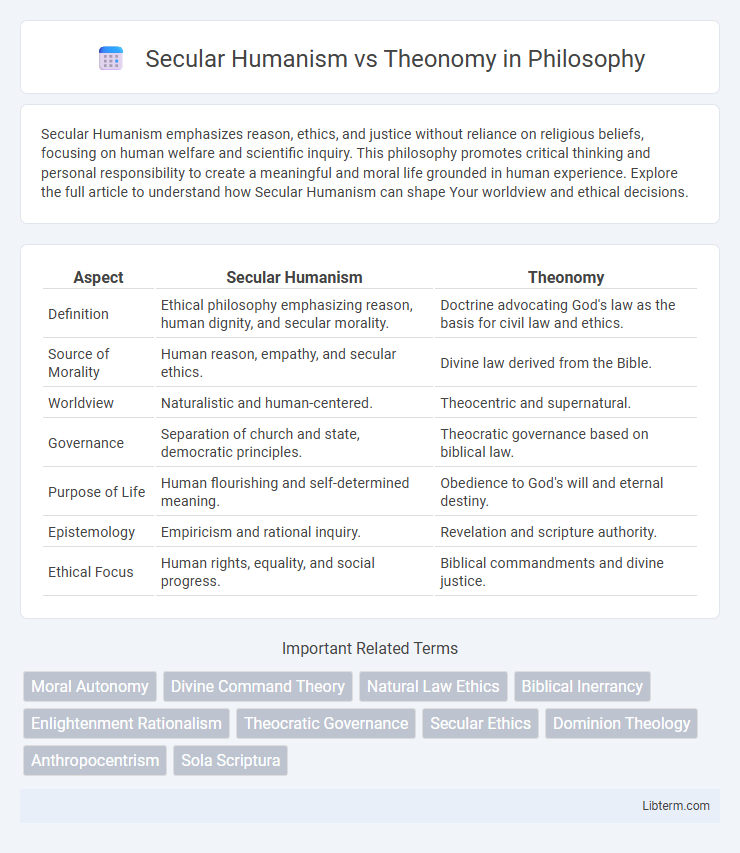Secular Humanism emphasizes reason, ethics, and justice without reliance on religious beliefs, focusing on human welfare and scientific inquiry. This philosophy promotes critical thinking and personal responsibility to create a meaningful and moral life grounded in human experience. Explore the full article to understand how Secular Humanism can shape Your worldview and ethical decisions.
Table of Comparison
| Aspect | Secular Humanism | Theonomy |
|---|---|---|
| Definition | Ethical philosophy emphasizing reason, human dignity, and secular morality. | Doctrine advocating God's law as the basis for civil law and ethics. |
| Source of Morality | Human reason, empathy, and secular ethics. | Divine law derived from the Bible. |
| Worldview | Naturalistic and human-centered. | Theocentric and supernatural. |
| Governance | Separation of church and state, democratic principles. | Theocratic governance based on biblical law. |
| Purpose of Life | Human flourishing and self-determined meaning. | Obedience to God's will and eternal destiny. |
| Epistemology | Empiricism and rational inquiry. | Revelation and scripture authority. |
| Ethical Focus | Human rights, equality, and social progress. | Biblical commandments and divine justice. |
Introduction to Secular Humanism and Theonomy
Secular Humanism promotes a worldview based on reason, ethics, and human dignity without reliance on supernatural beliefs, emphasizing individual autonomy and scientific inquiry. Theonomy asserts that civil laws should be based on biblical commandments, integrating divine law into governance to reflect a theocentric social order. Understanding these frameworks reveals contrasting foundations: Secular Humanism centers on humanist principles and secular ethics, while Theonomy prioritizes scriptural authority as the basis for legal and moral norms.
Core Philosophical Foundations
Secular Humanism centers on reason, ethics, and human-centered values derived from empirical evidence and secular philosophy, rejecting supernatural authority. Theonomy, rooted in Christian theological principles, advocates for divine law as the ultimate guide to morality and governance, emphasizing the application of biblical statutes in society. These core foundations create a fundamental dichotomy between human autonomy in Secular Humanism and divine sovereignty in Theonomy.
Historical Development and Context
Secular Humanism emerged during the Enlightenment as a philosophy emphasizing reason, science, and human rights without reliance on divine authority, shaping modern secular societies. Theonomy arose in the 20th century within Christian Reconstructionism, advocating the application of biblical law to governance and society, rooted in Reformed theology. The historical tension between these worldviews reflects broader shifts from religiously grounded legal frameworks to secular, human-centered ones in Western history.
Views on Morality and Ethics
Secular Humanism grounds morality and ethics in reason, human experience, and scientific inquiry, asserting that ethical principles evolve through societal progress and empathy without reliance on divine authority. Theonomy, by contrast, bases moral law on the Bible, maintaining that ethical standards are divinely ordained and immutable, guiding society through adherence to scriptural mandates. This fundamental divergence leads Secular Humanism to prioritize human autonomy and pluralism, while Theonomy emphasizes obedience to God's law as the ultimate moral directive.
Approaches to Law and Governance
Secular Humanism advocates for a legal system grounded in reason, human rights, and empirical evidence, promoting laws that evolve with societal needs and prioritize individual freedoms. Theonomy asserts that civil laws should be directly based on biblical commandments, emphasizing divine authority as the ultimate source of governance and moral order. This fundamental difference influences their approaches to legislation, with Secular Humanism supporting secular democracy and Theonomy endorsing the implementation of theocratic principles in state governance.
Perspectives on Individual Rights and Freedoms
Secular Humanism prioritizes individual rights and freedoms based on reason, ethics, and human dignity without reliance on religious doctrine, advocating for secular governance that upholds civil liberties. Theonomy, grounded in divine law as interpreted from scripture, often places communal obligations and religious mandates above personal autonomy, emphasizing a society governed by God's law. These contrasting perspectives shape debates on moral authority, legal frameworks, and the extent of personal liberty within secular versus theocratic systems.
Impact on Education and Social Institutions
Secular humanism promotes education grounded in empirical science and ethical reasoning, emphasizing critical thinking and human rights without reliance on religious doctrines. Theonomy advocates for social institutions and educational systems governed by biblical law, seeking to align societal norms and legal frameworks strictly with scriptural principles. These contrasting approaches influence curricula content, governance policies, and legal standards, shaping societal values and the role of religion in public life.
Responses to Pluralism and Diversity
Secular Humanism embraces pluralism and diversity by advocating for individual autonomy, secular ethics, and inclusivity in a multicultural society. Theonomy, rooted in divine law, often challenges pluralism by emphasizing adherence to biblical statutes, potentially conflicting with diverse moral perspectives. This fundamental difference shapes contrasting approaches to governance, social norms, and intergroup relations within diverse populations.
Critiques and Controversies
Secular Humanism faces critiques for its reliance on human reason and ethics detached from divine authority, which opponents argue leads to moral relativism and societal decay. Theonomy is criticized for its proposal to govern society by biblical law, raising concerns about the imposition of a specific religious framework on a pluralistic population and potential conflicts with democratic principles. Both perspectives generate controversy over the source and application of moral authority, often sparking debates on freedom, governance, and cultural values.
Contemporary Relevance and Future Trends
Secular Humanism emphasizes reason, ethics, and human autonomy, shaping contemporary debates on morality, law, and governance by promoting secular, inclusive frameworks. Theonomy advocates for divine law as the foundation of societal order, influencing certain political movements seeking to integrate religious principles into legal systems. Future trends suggest increasing dialogue and tension between these paradigms as societies navigate pluralism, secular governance, and religious freedom in a globalized world.
Secular Humanism Infographic

 libterm.com
libterm.com